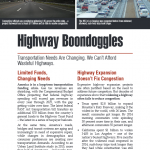Factsheet: Highway Boondoggles
Transportation Needs Are Changing. We Can’t Afford Wasteful Highways.
These highway boondoggles are but a sampling of many questionable highway projects nationwide that could cost taxpayers tens of billions of dollars to build, and many more billions over the course of upcoming decades to maintain.
Downloads

U.S. PIRG Education Fund
Limited Funds, Changing Needs
America is in a long-term transportation funding crisis. Gas tax revenues are shrinking, with the Congressional Budget Office projecting that federal highway spending will exceed gas revenues in every year through 2025, with the gap getting wider over time. The latest federal FAST Act transportation bill transfers an additional $70 billion from the country’s general funds to the Highway Trust Fund – the latest in a series of taxpayer bailouts.
At the same time, America’s roads, bridges and transit systems are aging and increasingly in need of expensive repair, while changes in demographics and consumer preferences are creating new transportation demands. According to an Urban Land Institute study in 2015, more than half of Americans – and nearly two-thirds of Millennials, the country’s largest generation – want to live “in a place where they do not need to use a car very often.”
Highway Expansion Doesn’t Fix Congestion
Expensive highway expansion projects are often justified based on the need to address future congestion. But decades of experience show that
widening a highway often fails to reduce congestion:
- Texas spent $2.8 billion to expand Houston’s Katy Freeway, making it the widest in the world, with 26 lanes. The result: commutes got longer. By 2014 morning commuters were spending 30 percent more time in their cars, and afternoon commuters 55 percent longer.
- California spent $1 billion to widen I-405 in Los Angeles – one of the nation’s busiest highways. Five months after the widened road reopened in 2014, rush-hour trips took longer than they had while construction was still ongoing.
Boondoggles We Can’t Afford
Boondoggle highway projects absorb scarce resources that can be better used for other needs. State governments should cancel or downsize wasteful highway projects and use the funds to fix potholes and bridges and invest in 21st century transportation solutions, including public transportation.
State and federal taxpayers should demand transparency, accountability and performance in transportation spending and insist that questionable highway projects are re-evaluated based on the latest data and knowledge of America’s transportation needs.
Highway Boondoggles Can Be Stopped
Several state and local governments have taken steps to reevaluate, reshape or eliminate boondoggle highway projects.
- The Illiana Expressway, a $1.3 billion to $2.8 billion tollway to stretch from I-55 in Illinois to I-65 in Indiana, was canceled after a federal judge rejected the highway’s environmental analysis as faulty and state officials questioned the road’s expense.
- The Trinity Parkway in Dallas, a $1.5 billion proposal to build a six-lane, nine-mile tolled highway along the river in the middle of the city, was downsized to four lanes after criticism from the community.
- A proposal to widen I-94 in Milwaukee has been denied funding by state lawmakers in the wake of community opposition to the project and questions about the accuracy of state officials’ traffic forecasts.